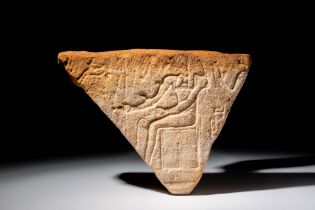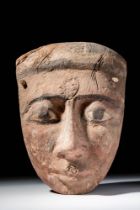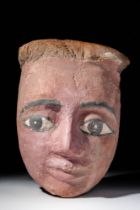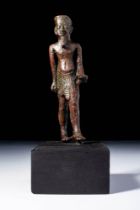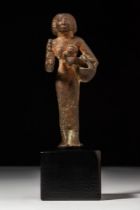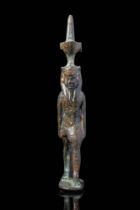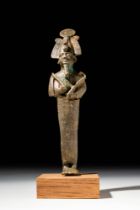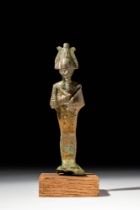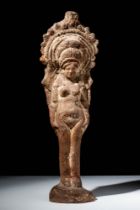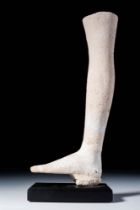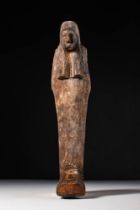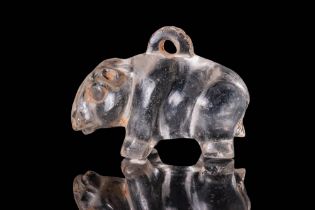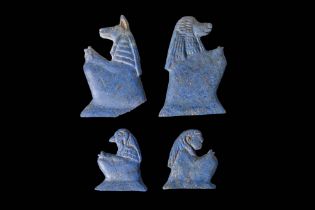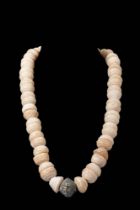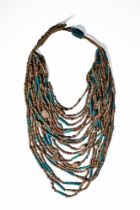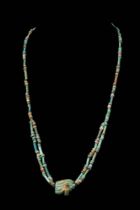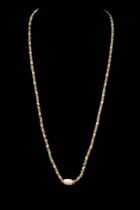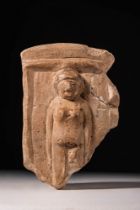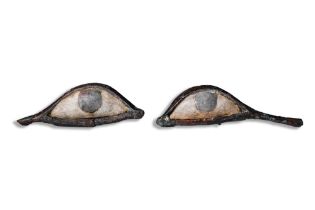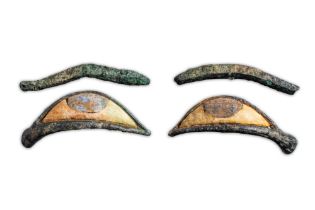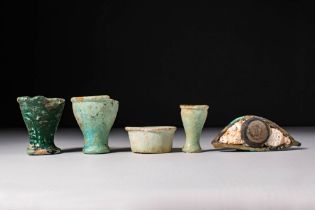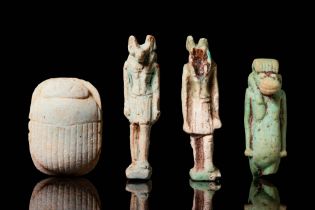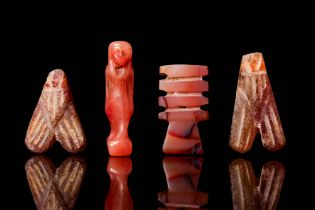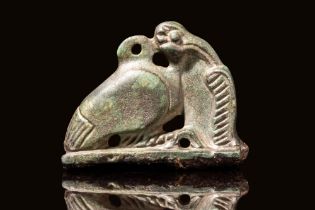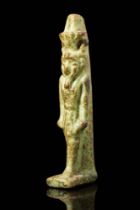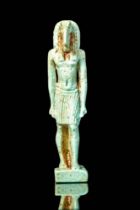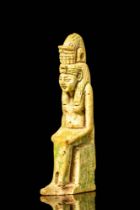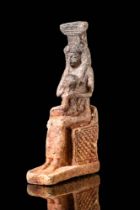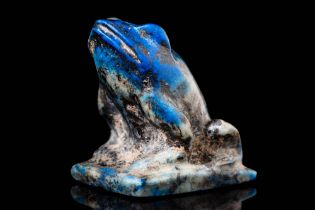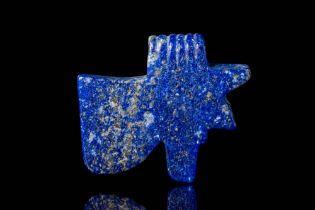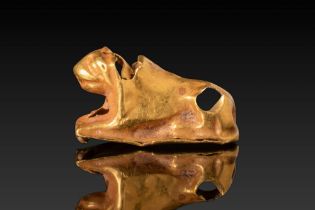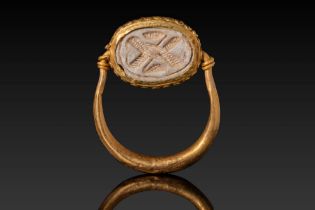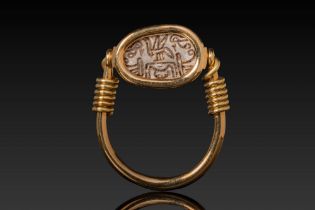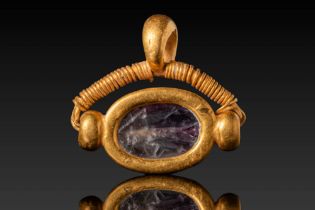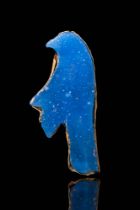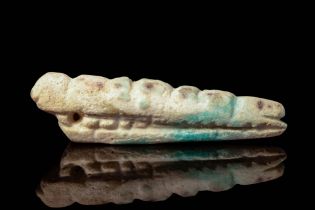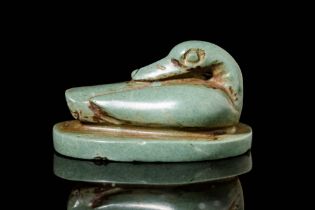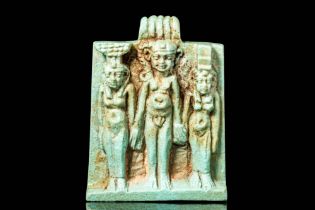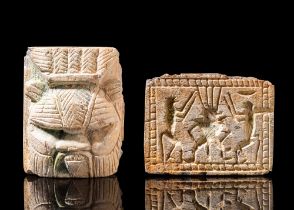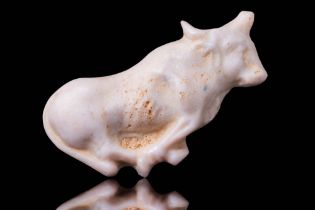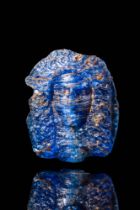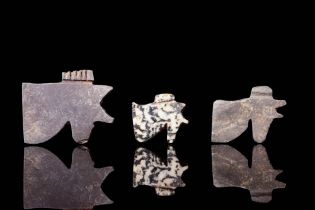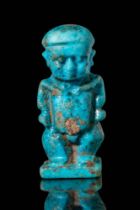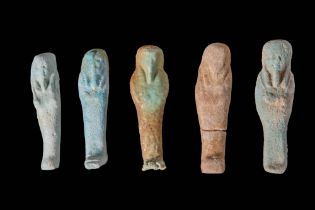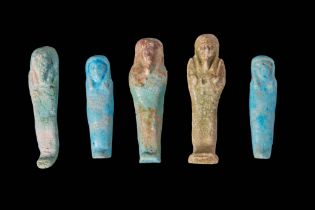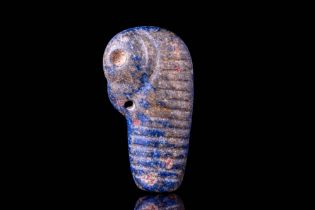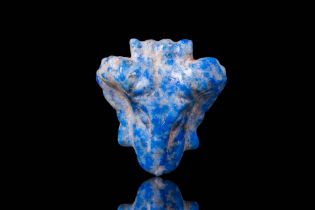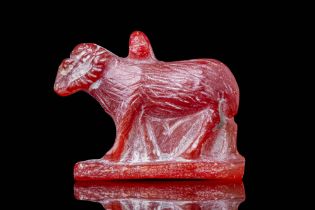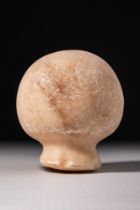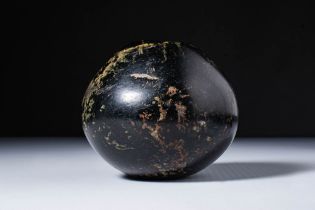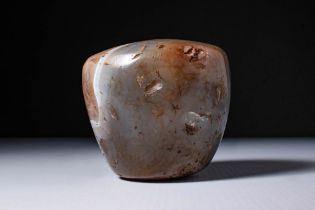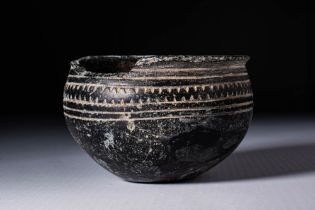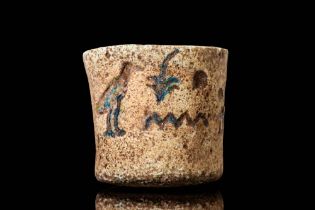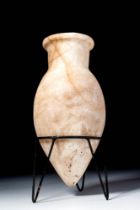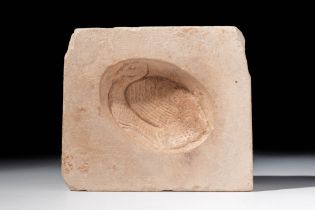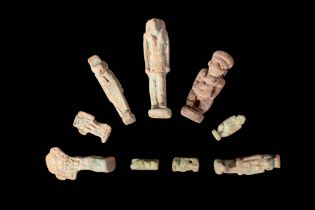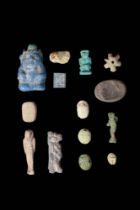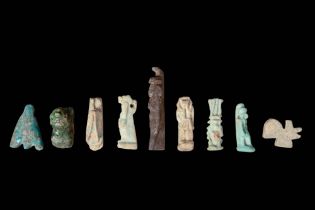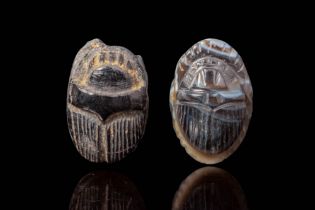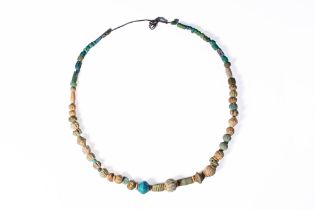Refine your search
Sale Section
- Achaemenid (2)
- Amlash (11)
- Ancient China (1)
- Anglo-Saxon (2)
- Asian Art (1)
- Assyrian (1)
- Bactrian (12)
- Bronze Age (19)
- Byzantine (12)
- Celtic (3)
- Cupisnique (1)
- Cypriot (8)
- Daunian (6)
- Egyptian (71)
- Etruscan (7)
- Gandharan (1)
- Greek (48)
- Himalayan (1)
- Indus Valley (5)
- Islamic Art (1)
- Jalisco (1)
- Korean (1)
- Late China (3)
- Levantine (5)
- Medieval (18)
- Merovingian (10)
- Mesopotamian (4)
- Mid China (2)
- Mixtec (1)
- Phoenician (3)
- Phrygian (1)
- Post-medieval (6)
- Roman (71)
- Romano-Egyptian (2)
- Sasanian (10)
- Scythian (4)
- Seljuk (5)
- Stamp seals (5)
- Sumerian (1)
- Syro-Hittite (1)
- Umayyad (4)
- Viking (14)
- Villanovan (1)
- Western Asiatic (14)
Estimate
Category
- Jewellery (122)
- Taxidermy & Natural History (48)
- Greek, Roman, Egyptian & other antiquities (41)
- Sculpture (40)
- Glassware (28)
- Ceramics (25)
- Collectables (25)
- Salvage & Architectural Antiques (20)
- Arms, Armour & Militaria (19)
- Metalware (13)
- Books, Manuscripts & Periodicals (9)
- Coins (9)
- Vintage Fashion (9)
- Chinese Works of Art (8)
- Clocks (7)
- Islamic Works of Art (7)
- Toys, Models & Dolls (7)
- Lighting (6)
- Porcelain (6)
- Ethnographica & tribal art (5)
- Furniture (5)
- Scientific Instruments (4)
- Kitchenalia (2)
- Oil, Acrylic paintings & Mixed Media (2)
- Classic Cars, Motorcycles & Automobilia (1)
- Russian Works of Art (1)
- Silver & Silver-plated items (1)
- Sporting Memorabilia & Equipment (1)
- Stamps (1)
- Textiles (1)
Creator / Brand
Item Type
- Necklaces, Pendants & Medallions (53)
- Ring (50)
- Pendant (38)
- Band (27)
- Gemstone (25)
- Gold Ring (25)
- Beads (24)
- Necklace (23)
- Intaglio (20)
- Bowl (17)
- Earrings (17)
- Garnet (17)
- Jug (13)
- Amulet (11)
- Gold Pendant (9)
- Knives and Blades (9)
- Scarab (9)
- Lamp (8)
- Vessel (8)
- Armour (7)
- Ceramic Jug (7)
- Dagger (7)
- Knives (7)
- Sculpture (7)
- Spearhead (7)
- Bracelet (6)
- Figure (6)
- Jar (6)
- Silver Ring (6)
- Ceramic Bowl (5)
- Cup (5)
- Dish (5)
- European Coin (5)
- Flask (5)
- Glass Bowl (5)
- Letter (5)
- Ushabti (5)
- Amethyst (4)
- Beaker (4)
- Ceramic Cup (4)
- Column (4)
- Figurine (4)
- Glasses (4)
- Bear (3)
- Bottle (3)
- Brooch (3)
- Ceramic Figurine (3)
- Chain (3)
- Chinese Art by Period / Style (3)
- Collar (3)
- Plaque (3)
- Bear Taxidermy (2)
- British Coin (2)
- Cameo (2)
- Cloisonne (2)
- Coin (2)
- Glass Beaker (2)
- Glass Bottle (2)
- Groat (2)
- Intaglio Ring (2)
- Kantharos (2)
- Krater (2)
- Medallion (2)
- Pin (2)
- Posy Ring (2)
- Shield (2)
- Silver Bracelet (2)
- Sword (2)
- Taxidermy (2)
- Bags & Handbags (1)
- Balustrade (1)
- Bell (1)
- Belt (1)
- Belt buckle (1)
- Carving (1)
- Casket (1)
- Ceramic Dish (1)
- Chinese Bowl (1)
- Compact (1)
- Crown (1)
- Cuff (1)
- Cups (1)
- Emerald (1)
- Glass Jug (1)
- Jewellery Brands (1)
- Kilt (1)
- Lighter (1)
- Marble Sculpture (1)
- Mosque Lamp (1)
- Pearls (1)
- Porcelain (1)
- Purse (1)
- Robe (1)
- Round (1)
- Signet Ring (1)
- Silver Crown (1)
- Skyphos (1)
- Statuette (1)
- Stele (1)
- Surround (1)
- Terracotta Figure (1)
- Turquoise (1)
- Van (1)
- List
- Grid
A subscription to the Price Guide is required to view results for auctions ten days or older. Click here for more information
EGYPTIAN SANDSTONE RELIEF
New Kingdom, Ca. 1550 - 1069 BC.A triangular fragment of sandstone relief carved in raised outline with the figure of a seated man facing left. He...
Late Period to Ptolemaic Period, Ca. 664 - 30 BC.A wooden mask from a sarcophagus with a broad, rounded face and gently tapering chin. The facial ...
Late Period to Ptolemaic Period, Ca. 664 - 30 BC.A wooden mask from a sarcophagus with a broad, rounded face and gently tapering chin. The facial ...
Late Period, Ca. 664 - 332 BC.A bronze statuette of the god Amun depicted striding forward with the left leg advanced. He wears a short kilt and a...
22nd Dynasty, Ca. 943 - 720 BC.A leaded bronze figurine of a priestess depicted standing and holding a sistrum in her right hand and an aegis with...
EGYPTIAN BRONZE FIGURE OF NEFERTEM
Ca. 664 - 30 BC.A bronze figure of Nefertem, depicted standing in a rigid frontal pose with arms held straight alongside the body. He wears a trip...
EGYPTIAN BRONZE PHARAOH AS OSIRIS
Ca. 664 - 332 BC.A bronze figure of a pharaoh depicted as Osiris, shown mummiform with arms crossed and hands holding a crook and flail. The figur...
EGYPTIAN BRONZE PHARAOH AS OSIRIS
Ca. 664 - 332 BC.A bronze figure of a pharaoh represented as Osiris, standing mummiform with arms crossed, holding the crook and flail. The figure...
Ca. 200 - 100 BC.A terracotta figurine of Isis-Aphrodite shown nude, with her arms resting along the sides of her body and the legs joined. She we...
EGYPTIAN PLASTER MODEL OF LEG
Late Dynastic - Ptolemaic periods, Ca. 664 - 30 BC.A plater right leg depicted naturalistically with a flexed foot and well-defined toes. The calf...
EGYPTIAN WOODEN USHABTI
New Kingdom, Ca. 1550 - 1069 BC.A wooden ushabti figure depicted standing with hands placed on the chest and wearing a tripartite wig. Its side la...
Middle Kingdom, Ca. 2055 - 1790 BC.A small amulet carved from translucent rock crystal in the form of a Hippo with a rounded body and short legs. ...
Late Period, Ca. 664 - 332 BC.A collection of four lapis lazuli inlays, each representing one of the Four Sons of Horus - protective deities assoc...
Ca. 3600 - 3100 BC.A necklace composed of sizeable disc-shaped beads in pale alabaster, restrung symmetrically with a single black stone bead of b...
Ca. 1550 - 30 BC.A multi-strand restrung necklace composed of tubular and ring-shaped faience beads in blue, green, and beige tones. Interspersed ...
Third Intermediate Period, Ca. 1069 - 664 BC.A restrung necklace consisting of a strand of small, round faience beads that splits into two strands...
Late Period, Ca. 664 - 30 BC. A restrung necklace with an assortment of multicoloured faience annular beads. The central section features a large,...
Late Period, Ca. 664 - 332 BC.A fragment of a stone relief depicting a standing female figure within a recessed niche with a raised border. She is...
PAIR OF EGYPTIAN EYE INLAYS
Late Period, Ca. 664 - 30 BC.A pair of bronze eye inlays with elongated almond-shaped contours and tapering outer edges. Each inlay contains a cen...
Late Period, Ca. 664 - 30 BC.A pair of eye inlays and separate bronze eyebrows. Each eye inlay is shaped with an elongated contour and inset with ...
Late Period, Ca. 664 - 30 BC.A collection of faience objects, including small cups and an eye inlay. The cups are of varying shapes and sizes, som...
Late and Ptolemaic Period, Ca. 664 - 30 BC. A collection of four green faience amulets. The object on the left is a scarab amulet with a finely in...
New Kingdom, Ca. 1550 - 1069 BC. A collection of four carnelian amulets. The two amulets on the outside are fly amulets, carved with incised lines...
Ca. 1st millennium BC.A greenish stone amulet depicting Thoth, the ibis deity of wisdom and writing, shown with a Maat feather as a sign of justic...
EGYPTIAN FAIENCE NEFERTEM AMULET
Late Period, Ca. 664 - 332 BC.A faience amulet depicting Nefertem in a striding pose with his left leg forward. He wears a short kilt and a tall l...
EGYPTIAN FAIENCE THOTH AMULET
Ca. 664 - 332 BC.A pale blue glazed faience amulet of Thoth, depicted in a striding pose with arms held close to the body. The figure has the char...
EGYPTIAN FAIENCE AMULET OF HATMEHYT
Ca. 664 - 332 BC.A faience amulet depicting the goddess Hatmehyt, was worshipped in the Delta city of Mendes. Her name means "She who is before th...
Late Period, Ca. 664 - 332 BC.A faience amulet depicting Isis seated on a rectangular throne, nursing the child Horus. The left arm supports the c...
EGYPTIAN LAPIS LAZULI FROG AMULET
Late Period, Ca. 664 - 332 BC.A lapis lazuli amulet in the form of a frog, depicted in a crouching position atop a rectangular base. The amulet is...
Late Period, Ca. 664 - 332 BC.A lapis lazuli Wedjat eye amulet, carved in the shape of the Eye of Horus with a stylised, angular form. The amulet ...
Middle Kingdom Ca. 2055 - 1790 BC.A hollow pendant shaped from a thin gold sheet, depicting a recumbent lion with its head raised and mouth slight...
New Kingdom, Ca. 1550 - 1069 BC.A steatite scarab engraved on the underside with a symmetrical pattern of interwoven elements. It is set within a ...
New Kingdom, Ca. 1550 - 1069 BC.A steatite scarab with a hieroglyphic inscription on its underside, enclosed within an oval cell of a gold swivel ...
Late Period, Ca. 664 - 332 BC.A gold pendant with an amethyst scarab, set within a rounded bezel with two spherical terminals. A coiled gold wire ...
New Kingdom, Ca. 1550 - 1069 BC.A gold and blue glass pendant in the form of a stylised bird. The pendant is crafted from a single piece of blue g...
EGYPTIAN FAIENCE CROCODILE AMULET
Late Period to Ptolemaic Period, Ca. 664 - 30 BC.A faience amulet in the form of a crocodile, representing Sobek. The elongated body is modelled w...
EGYPTIAN STONE DUCK AMULET
Late Period to Ptolemaic Period, Ca. 664 - 30 BC.A stone amulet in the form of a recumbent duck, depicted with a rounded body, a long, slightly cu...
Ca. 664 - 30 BC.A green-glazed faience amulet depicting a triad in high relief. The central figure represents Horus, shown nude. He is flanked by ...
Early Ramesside, Ca. 1200 BC.A steatite plaque with the head of the god Bes, protector of pregnant women, is seen on the back, while the god Bes f...
EGYPTIAN GLASS BULL IDOL
Late Period, Ca. 664 - 332 BC.An amulet in the form of a reclining bull, modelled in the round. The body is rendered with a broad back, a curved s...
Ca. 3rd - 1st century BC.A blue glass amulet depicting a female goddess. Reviewed by Simone Musso, consultant curator for Egyptian antiquities at ...
Late and Ptolemaic Period, Ca. 664 - 30 BC. A collection of three stone Eye of Horus amulets. The one on the left is the largest, carved from dark...
EGYPTIAN FAIENCE PATAIKOS AMULET
Third Intermediate Period to Late Period, Ca. 1069 - 332 BC.A blue faience amulet of Pataikos depicted as a squat, nude figure standing on a recta...
Late Period to Ptolemaic Period, Ca. 664 - 30 BC.A collection of five faience ushabtis, each moulded in a simplified mummiform shape. All figures ...
Third Intermadiate Period to the Ptolemaic Period, Ca. 1069 - 30 BC.A collection of five faience ushabtis, each moulded in a simplified mummiform ...
Ca. 664 - 332 BC.A blue lapis lazuli amulet in the form of a mummified falcon, with incised horizontal bands across the body, recessed eyes and a ...
EGYPTIAN LAPIS LAZULI HEAD OF RAM
Late Period, Ca. 664 - 332 BC.A lapis lazuli ram’s head modelled in frontal view with curved horns closely aligned to the face, recessed almond-sh...
EGYPTIAN RED GLASS RAM AMULET
Late Period, Ca. 664 - 332 BC.An amulet made of translucent red glass, modelled in the form of a striding ram. The animal is shown in profile with...
EGYPTIAN STONE MACE HEAD
Predynastic Period, Ca. 3600 - 3100 BC.A globular stone mace head with a smooth, rounded body tapering towards a flaring, slightly flattened base....
Predynastic, Ca. 3600 - 3100 BC.An exquisitely crafted and well-preserved ceremonial mace head made of finely veined black marble. It has a drille...
MAGNIFICENT EGYPTIAN AGATE MACE HEAD
Predynastic, Ca. 3600 - 3100 BC.A mace head of banded agate with a central perforation drilled lengthwise. The surface displays natural inclusions...
Ca. 1600 - 1200 BC.A stone bowl with a rounded body and a slightly everted rim. The upper section is encircled by parallel incised bands framing a...
EGYPTIAN INLAID FAIENCE BEAKER
Late Period, Ca. 664 - 332 BC.A faience beaker with a flaring profile and a slightly rounded base. The exterior is decorated with a blue inlaid se...
EGYPTIAN ALABASTER VESSEL
Ca. 2900 - 2200 BC.A slender alabaster vessel with an elongated piriform body tapering to a pointed base and a short cylindrical neck widening int...
EGYPTIAN STONE MOULD
New Kingdom, Ca. 1550 - 1069 BC.A rectangular limestone mould with a deep oval recess with a left-facing bird in low relief. The bird is shown in ...
Late Period, Ca. 664 - 332 BC.A collection of nine faience amulets representing various deities, including, among others, Shu with his hands raise...
Late Period, Ca. 664 BC - AD 200.A collection of fifteen amulets crafted from faience, stone, and bronze, featuring deity representations of Bes, ...
Late Period, Ca. 664 BC - AD 200.A collection of nine faience and stone amulets, including the Eye of Horus, zoomorphic forms such as a fly and va...
PAIR OF EGYPTIAN AGATE SCARABS
Late Period, Ca. 664 - 30 BC.A pair of agate scarabs, one in deep dark tones and the other exhibiting a banded variation. Each has a rounded, dome...
Ca. 2055 - 332 BC.A restrung necklace with mainly beige faience beads concentrated in the central section, including melon-shaped, biconical, and ...

